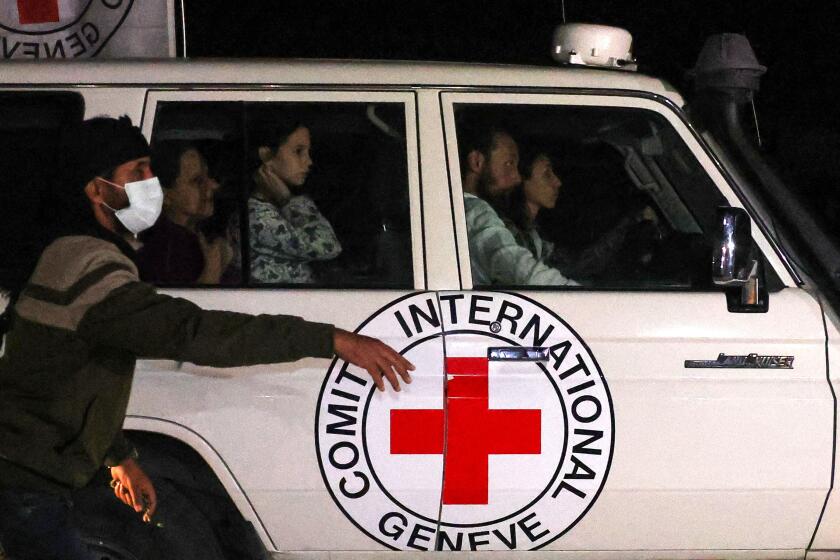Opinion: With no end in sight to Netanyahu’s war in Gaza, will Biden ever say ‘enough’?

- Share via
A week before I resigned from the State Department last October, I reminded my colleagues that it had been clear for decades that the only route to the just and lasting peace that all civilians in Israel and Palestine deserve is not through military victory, but through diplomatic compromise. It’s not through creating fear, but through building trust; not through killing enemies, but through making friends; not through imposing suffering, but through inspiring hope.
Unfortunately, more than three months later, the United States and its Israeli partner continue to pursue the first option in each of those choices. Palestinian officials say Gaza’s death toll is now more than 24,000 people, though U.S. officials concede it is likely higher.
For those looking for an end to the conflict in Gaza, and a just and lasting resolution of the Israeli-Palestinian peace process, the future looks bleak. The status quo we have found ourselves in is characterized by unresolvable contradictions between the equities of the various stakeholders involved, and even their own policy priorities. The result? A labyrinth where every turn leads to a dead end.
President Biden marked the 100th day in captivity for hostages of Hamas without mentioning the 24,000 Palestinians killed by Israel in that time.
Take Israel’s explicit objectives in its operations in Gaza: to free the hostages, and to destroy Hamas. As has become increasingly clear, even to the Israeli public, the country can pick one or the other, but it is unlikely to achieve both.
Or take the future rule of Gaza: This week, Prime Minister Benjamin Netanyahu made clear that he has no interest in a Palestinian state emerging from the current conflict. To those who have followed his statements for some time, this was not news: Netanyahu has repeatedly celebrated his success in stymieing the creation of the state promised by the Oslo Accords process.
At the same time, he has also pledged to his followers that there will be no unified rule by the Palestinian Authority of Gaza and the West Bank. Meanwhile, U.S. Secretary of State Anthony Blinken has been flying around the Middle East and Europe pledging American support for a path to Palestinian statehood. But let’s assume some sort of identifiable Palestinian entity did emerge to run both the West Bank and Gaza: For Israel and the U.S., a role for Hamas in that entity is unacceptable. So the options being put forward by the U.S. and Israel appear to run from “you can’t have self-governance, let alone a state” to “you might have a state eventually, but we’ll tell you who you can elect.”
With 20,000 dead in Israel’s bombing of Gaza, we feel compelled to prove our humanity. We have been denied agency as a people.
What about the reconstruction of Gaza, where three-quarters of the housing stock has been damaged or destroyed, not to mention the devastation of infrastructure such as water, electricity, hospitals and even schools and universities? Rebuilding would cost tens of billions of dollars and take a decade under the best of circumstances. But Israel is likely to remain opposed to the importation of many construction materials that it considers “dual use” — meaning bad actors could exploit the goods for other purposes. Meanwhile, Arab countries have told the U.S. they will not invest in the construction of facilities that will just be leveled again in five years — yet who can imagine Israel promising it won’t take such action?
And what of the Palestinians who survive the current bombardment? There is insufficient infrastructure to feed, clothe and employ them in Gaza, but the idea of a resettlement of hundreds of thousands of desperate civilians out of Gaza, even a temporary one, smacks of a second Nakba, when Palestinians were displaced from their homes in 1948, and comes with no guarantees Israel will let them reenter the strip.
South Africa made compelling arguments in its case charging Israel with genocide in Gaza. But the court should also weigh the ongoing threat of Hamas.
Everywhere one looks, there are only dead ends. On the current path, the most likely future is one without a Palestinian state but also without a clear alternative. One without a cease-fire, in which Israel regularly strikes at those it assesses to be a threat, both in Gaza and in the West Bank. One in which Palestinian citizens of Israel and residents of East Jerusalem face increased repression in a more polarized society. One in which there is a permanent humanitarian crisis in Gaza and an emerging refugee crisis in the Sinai.
In this most likely of futures, everyone loses. The Palestinians continue to suffer in increasingly grotesque conditions. Israel loses the chance at a lasting peace, becomes increasingly isolated from the world community, and never gains the real security its citizens deserve. The Middle East raises another generation prone to radicalization. And the United States loses any remaining thread of moral credibility, and finds itself tied into another disaster in the region at a time when it is so urgently seeking to shift its focus farther east.
The current truce is an important step. But the U.S. government should join in global calls for a cease-fire in Gaza.
It does not have to be this way — it has not had to be this way for months. The United States, and its allies and partners, have the leverage to force the parties to the conflict to make the necessary concessions, starting with a cease-fire, recognition of Palestinian statehood and support for all the diplomatic, economic and security steps that will be needed to set off on the right course.
Instead, President Biden remains stuck in his embrace of Netanyahu, continuing to provide, without condition, the arms being used to devastate Gaza, the diplomatic cover being used to prevent real political solutions or any accountability under international law, and as committed as ever to whatever course Israel sets, however contradictory or harmful to both Israeli and American interests.
The current path leads nowhere. It is time for America to change direction.
Josh Paul was, until recently, a director in the State Department’s Bureau of Political-Military Affairs.
More to Read
A cure for the common opinion
Get thought-provoking perspectives with our weekly newsletter.
You may occasionally receive promotional content from the Los Angeles Times.














